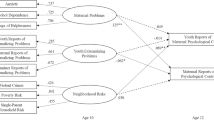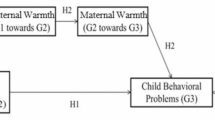Abstract
A distinction between parental behavioral control and psychological control has been elucidated in the literature, yet far less is known about the role of psychological control in youth adjustment broadly or risky behavior in particular. We examined the interrelationship of maternal psychological control, youth psychosocial adjustment, and youth risk behaviors among African American single mother-youth (11–16-year old) dyads (n = 194), families in which youth are more vulnerable to adjustment problems and risky behavior than Caucasian youth or youth from intact homes. Higher levels of maternal psychological control were associated with increased youth psychosocial adjustment problems as well as increased youth risk behavior, after statistically controlling for one domain of behavioral control, parental knowledge about a child’s whereabouts and activities. Furthermore, youth externalizing problems mediated the relation between psychological control and risk behavior. The findings suggest that parenting programs targeting risk behavior among African American youth may benefit from including psychological control among the parenting dimensions that are targeted.
Similar content being viewed by others
References
Achenbach, T. M. (1991). Manual for child behavior checklist 4–18 and 1991 profile. Burlington: University of Vermont, Department of Psychiatry.
Barber, B. K. (1996). Parental psychological control: Revisiting a neglected construct. Child Development, 67(6), 3296–3331.
Barber, B. K. (2002). Intrusive parenting: How psychological control affects children and adolescents. Washington, DC, US: American Psychological Association.
Barber, B. K., & Harmon, E. L. (2002). Violating the self: Parental psychological control of children and adolescents. In B. K. Barber (Ed.), Intrusive parenting: How psychological control affects children and adolescents. Washington, DC, US: American Psychological Association.
Baron, R. M., & Kenny, D. A. (1986). The moderator mediator variable distinction in social psychological research—Conceptual, strategic, and statistical considerations. Journal of Personality and Social Psychology, 51, 1173–1182.
Baumrind, D. (1978). Parental disciplinary patterns and social competence in children. Youth and Society, 9, 239–276.
Baumrind, D. (1991). The influence of parenting style on adolescent competence and substance use. Journal of Early Adolescence, 11(1), 56–95.
Bean, R. A., Barber, B. K., & Crane, D. R. (2006). Parental support, behavioral control, and psychological control among African American youth: The relationships to academic grades, delinquency, and depression. Journal of Family Issues, 27(10), 1335–1355.
Black, M. M., Oberlander, S. E., Lewis, T., Knight, E. D., Zolotor, M. D., Litrownik, A. J., et al. (2009). A prospective investigation of sexual intercourse among adolescents maltreated prior to age 12. Pediatrics, 124, 941–949.
Brody, G. H., Murry, V. M., Gerrard, M., Gibbons, F. X., McNair, L., Brown, A. C., et al. (2006). The strong African American families program: Prevention of youths’ high-risk behavior and a test of a model of change. Journal of Family Psychology, 20(1), 1–11.
Center for Disease Control and Prevention. (2007a). HIV/AIDS surveillance report, 2007. Atlanta, GA: U.S. Department of Health and Human Services.
Center for Disease Control and Prevention. (2007b). Racial/Ethnic Disparities in Diagnoses of HIV—33 States, 2001–2005. Morbidity and Mortality Weekly Report, 56, 189–193.
Centers for Disease Control and Prevention. (2008). Youth risk behavior surveillance, United States, 2007. Morbidity and Mortality Weekly Report, 57(SS-4), 7–24.
Cooper, M. L., Frome, M. R., Russell, M., & Mudar, P. (1995). Drinking to regulate positive and negative emotions: A motivation model of alcohol use. Journal of Personality and Social Psychology, 69(5), 990–1005.
Cummings, E. M., Davies, P. T., & Campbell, S. B. (2000). Developmental psychopathology and family process: Theory, research, and clinical implications. New York, NY, US: Guilford Press.
Dittus, P., Miller, K. S., Kotchick, B. A., & Forehand, R. (2004). Why parents matter!: The conceptual basis for a community-based HIV prevention program for the parents of African American youth. Journal of Child and Family Studies, 13(1), 5–20.
Eisenberg, N., Fabes, R. A., Shepard, S. A., Guthrie, I. K., Murphy, B. C., & Reiser, M. (1999). Parental reactions to children’s negative emotions: Longitudinal relations to quality of children’s social functioning. Child Development, 70, 513–534.
Ivarsson, T., Gillberg, C., Arvidsson, T., & Broberg, A. G. (2002). The Youth Self-Report (YSR) and the Depression Self-Rating Scale (DSRS) as measures of depression and suicidality among adolescents. European Child and Adolescent Psychiatry, 11, 31–37.
Johnston, L. D., O’Malley, P. M., Bachman, J. G., & Schulenberg, J. E. (2009). Monitoring the Future national results on adolescent drug use: Overview of key findings, 2008 (NIH Publication No. 09–7401) (p. 73). Bethesda, MD: National Institute on Drug Abuse.
Jones, D. J., Forehand, R., Brody, G., & Armistead, L. (2002). Psychosocial adjustment of African American children in single-mother families: A test of three risk models. Journal of Marriage and Family, 64, 105–115.
Jones, D. J., Runyan, D., Lewis, T., Litrownik, A., Black, M., Wiley, T. et al. (2010). Violence exposure trajectories among high risk youth and their association with two subsequent HIV/AIDS risk behaviors. Journal of Clinical Child and Adolescent Psychology. (in press).
Jones, D. J., Zalot, A. A., Foster, S. E., Sterrett, E., & Chester, C. (2007). A review of childrearing in African American single mother families: The relevance of a coparenting framework. Journal of Child and Family Studies, 16, 671–683.
Kann, L. (2001). The youth risk behavior surveillance system: Measuring health-risk behaviors. American Journal of Health Behavior, 25(3), 272–277.
Kerr, M., & Stattin, H. (2000). What parents know, how they know it, and several forms of adolescent adjustment: Further support for a reinterpretation of monitoring. Developmental Psychology, 36(3), 366–380.
Kuppens, S., Grietens, H., Onghena, P., & Michiels, D. (2009). Relationship between parental psychological control and childhood relational aggression: Reciprocal in nature? Journal of Clinical Child and Adolescent Psychology, 38(1), 117–131.
Leadbeater, B. J., Banister, E. M., Ellis, W. E., & Yeung, R. (2008). Victimization and relational aggression in adolescent romantic relationships: The influence of parental and peer behaviors, and individual adjustment. Journal of Youth and Adolescence, 37(3), 359–372.
Leigh, B. C., & Stall, R. (1993). Substance use and risky sexual behavior for exposure to HIV: Issues in methodology. American Psychologist, 48, 1035–1045.
Mandara, J., & Pikes, C. L. (2008). Guilt trips and love withdrawal: Does mothers’ use of psychological control predict depressive symptoms among African American adolescents? Family Relations, 57(5), 602–612.
Martin, J. A., Hamilton, B. E., Sutton, P. D., Ventura, S. J., Menacker, F., Kirmeyer, S. et al. (2009). Births: Final data for 2006. National Vital Statistics Reports, 57(7), 1–104.
Mayer, R. R., Forster, J. L., Murray, D. M., & Wagenaar, A. C. (1998). Social settings and situations of underage drinking. Journal of Studies on Alcohol, 59(2), 207–215.
McLoyd, V. C., Cauce, A. M., Takeuchi, D., & Wilson, L. (2000). Marital processes and parental socialization in families of color: A decade review of research. Journal of Marriage and the Family, 62, 1070–1093.
Miller, K. S., Forehand, R., & Kotchick, B. A. (1999). Adolescent sexual behavior in two ethnic minority samples: The role of family variables. Journal of Marriage & the Family, 61(1), 85–98.
Miller, B. C., Norton, M. C., Curtis, T., Hill, E. J., Schvaneveldt, P., & Young, M. H. (1997). The timing of sexual intercourse among adolescents: Family, peer, and other antecedents. Youth Society, 29, 54–83.
Murry, V., Bynum, M., Brody, G., Willert, A., & Stephens, D. (2001). African American single mothers and children in context: A review of studies on risk and resilience. Clinical Child and Family Psychology Review, 4, 133–155.
O’Neal, C. R., & Magai, C. (2005). Do parents respond in different ways when children feel different emotions? The emotional context of parenting. Development and Psychopathology, 17, 467–487.
Perkins, D. F., Luster, T., Villarruel, F. A., & Small, S. (1998). An ecological risk-factor examination of adolescents’ sexual activity in three ethnic groups. Journal of Marriage & the Family, 60(3), 660–673.
Pettit, G. S., Laird, R. D., Dodge, K. A., Bates, J. E., & Criss, M. M. (2001). Antecedents and behavior-problem outcomes of parental monitoring and psychological control in early adolescence. Child Development, 72(2), 583.
Rodgers, K. B. (1999). Parenting processes related to sexual risk-taking behaviors of adolescent males and females. Journal of Marriage & the Family, 61(1), 99–109.
Sobel, M. E. (1982). Asymptotic intervals for indirect effects in structural equation models. In S. Leinhart (Ed.), Sociological methodology 1982 (pp. 290–312). San Francisco: Jossey-Bass.
Steele, C. M., & Josephs, R. A. (1990). Alcohol myopia: Its prized and dangerous effects. American Psychologist, 45, 921–933.
Substance Abuse and Mental Health Services Administration (SAMHSA). (2004). National Survey on Drug Use & Health.
Tinsley, B. J., Lees, N. B., & Sumartojo, E. (2004). Child and adolescent HIV risk: Familial and cultural perspectives. Journal of Family Psychology, 18(1), 208–224.
Tolou-Shams, M., Paikoff, R., McKirnan, D. J., & Holmbec, G. N. (2007). Mental health and HIV risk among African American adolescents: The role of parenting. Social Work in Mental Health, 5(1), 27–58.
U.S. Census Bureau (2005) Current population survey, 2004 annual social and economic (ASEC) supplement. Retrieved January 1, 2008, from http://www.census.gov/ population/www/socdemo/hh-fam/cps2004.html.
Walling, B. R., Mills, R. S. L., & Freeman, W. S. (2007). Parenting cognitions associated with use of psychological control. Journal of Child and Family Studies, 16, 642–659.
Acknowledgments
Support for this project was provided by the Ethnicity, Culture and Health Outcomes Program, a Junior Faculty Development Grant, a University Research Council Grant, the UNC Center for AIDS Research (CFAR; 9P30 AI050410), and the Centers for Disease Control and Prevention (K01 PS000795). We would like to thank the families of the African American Families and Children Together (AAFACT) study for their contributions, as well as Drs. Andrea Hussong and Martha Cox for their feedback.
Author information
Authors and Affiliations
Corresponding author
Rights and permissions
About this article
Cite this article
Kincaid, C., Jones, D.J., Cuellar, J. et al. Psychological Control Associated with Youth Adjustment and Risky Behavior in African American Single Mother Families. J Child Fam Stud 20, 102–110 (2011). https://doi.org/10.1007/s10826-010-9383-6
Published:
Issue Date:
DOI: https://doi.org/10.1007/s10826-010-9383-6




